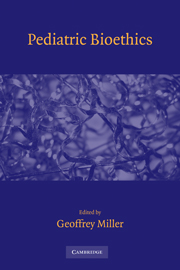9 - Presymptomatic Genetic Testing in Children
Published online by Cambridge University Press: 07 May 2010
Summary
Isn't ignorance the same as hope?
Jean Barema, The TestAs the fruits of the Human Genome Project transition into clinical care, the number of genetic conditions that medical professionals can test for is increasing rapidly. DNA-based tests are being developed to diagnose genetic disease, to determine predisposition to genetically based disorders, and to identify carrier status. Genetic testing may offer considerable benefit, but it is not without some peril. Because our ability to identify those at high risk for genetic conditions far outpaces our ability to treat or cure such conditions, many of those at risk are choosing not to be tested.
The genetic testing of children may have numerous diagnostic and prognostic applications for those who already have symptoms or who may develop them in the future. However, genetic testing in childhood for disorders that do not manifest until adult life is an area of particular sensitivity. Parental requests for the genetic testing of unaffected children and adolescents have raised a number of ethical issues and have led to several statements by professional organizations. The boards of directors of the American Society of Human Genetics (ASHG, 1995), the American College of Medical Genetics (ACMG 1995), the Council on Ethical and Judicial Affairs of the American Medical Association (AMA 1995), and National Society of Genetic Counselors (NSGC 1995) have all published statements on this issue.
The most ethically worrisome situations involve the testing of asymptomatic children for (1) genes for a late-onset disorder when there is no medical benefit to the child in the near future and (2) carrier status for a recessive or X-linked disorder when the information is not immediately useful for the child's reproductive decision making.
Keywords
- Type
- Chapter
- Information
- Pediatric Bioethics , pp. 125 - 140Publisher: Cambridge University PressPrint publication year: 2009



